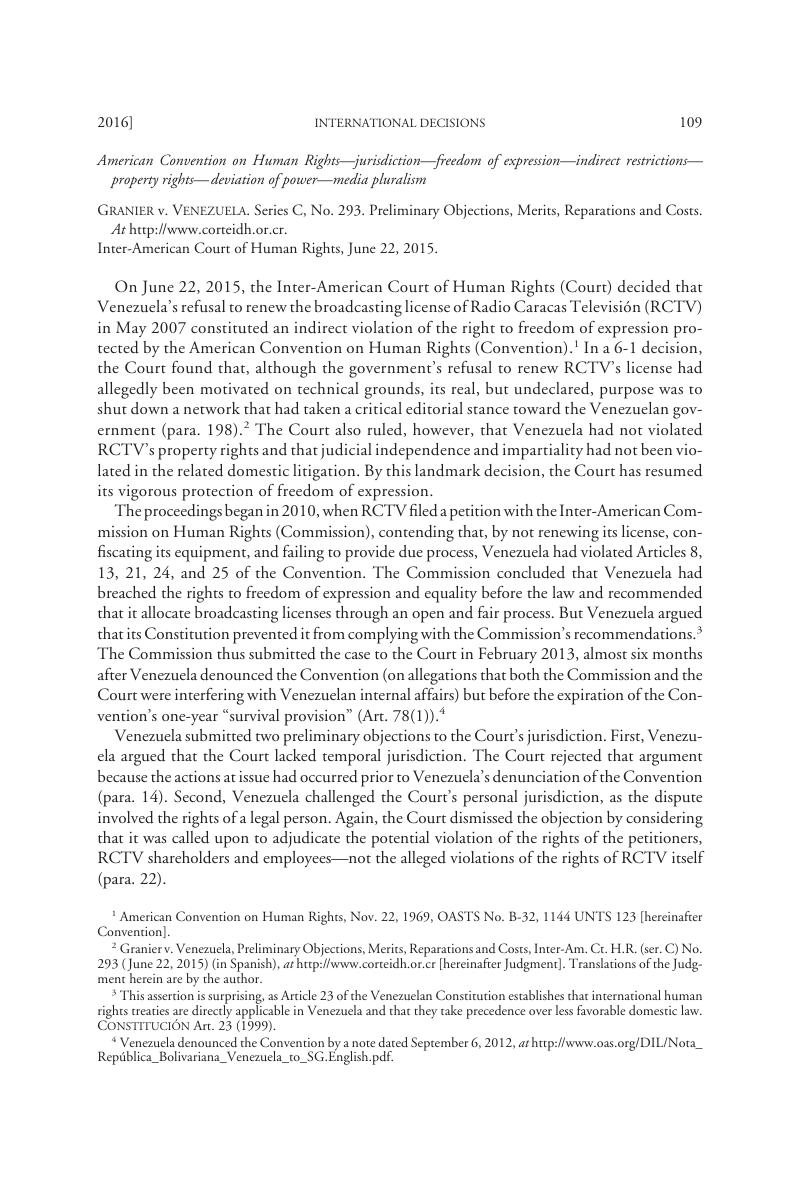Article contents
Granier v. Venezuela
Published online by Cambridge University Press: 20 January 2017
Abstract

- Type
- International Decisions
- Information
- Copyright
- Copyright © American Society of International Law 2016
References
1 American Convention on Human Rights, Nov. 22, 1969, OASTS No. B-32, 1144 UNTS 123 [hereinafter Convention].
2 Granier v. Venezuela, Preliminary Objections, Merits, Reparations and Costs, Inter-Am. Ct. H.R. (ser. C) No. 293 (June 22, 2015) (in Spanish), at http://www.corteidh.or.cr [hereinafter Judgment]. Translations of the Judgment herein are by the author.
3 This assertion is surprising, as Article 23 of the Venezuelan Constitution establishes that international human rights treaties are directly applicable in Venezuela and that they take precedence over less favorable domestic law. Constitución Art. 23 (1999).
4 Venezuela denounced the Convention by a note dated September 6, 2012, at http://www.oas.org/DIL/Nota_República_Bolivariana_Venezuela_to_SG.English.pdf.
5 Tribunal Supremo de Justicia, Sala Constitutional [TSJ, CC] [Supreme Court of Justice, Constitutional Chamber], 25 de mayo de 2007, Decisión No. 956.
6 Article 13(1) of the Convention, supra note 1, establishes that “[e]veryone has the right to freedom of thought and expression. This right includes freedom to seek, receive, and impart information and ideas of all kinds....”
7 See Ivcher Bronstein v. Peru, Merits, Reparations and Costs, Inter-Am. Ct. H.R. (ser. C) No.74 (Feb.6, 2001); Canese v. Paraguay, Merits, Reparations and Costs, Inter-Am. Ct. H.R. (ser. C) No. 111 (Aug. 31, 2004).
8 Mémoli v. Argentina, Preliminary Objections, Merits, Reparations and Costs, Inter-Am. Ct. H.R. (ser. C) No. 265 (Aug. 22, 2013).
9 Judge Caldas also considered the possibility of applying the provisions of the Convention to private actors such as the media. He stated that “[t]he issue here is under what terms the relation between private agents and the public sphere stands. As holders of power, those entities must be regulated and made responsible. As actors in the public sphere... they have public duties.” Judgment, Caldas, J., sep. op., para. 57.
10 E.g., Caesar v. Trinidad and Tobago, Merits, Reparations and Costs, Inter-Am. Ct. H.R. (ser. C) No. 123 (Mar. 11, 2005); Hilaire, Constantine, and Benjamin v. Trinidad and Tobago, Merits, Reparations and Costs, Inter-Am. Ct. H.R. (ser. C) No. 94 (June 21, 2002) (joined cases).
11 Article 1(2) of the Convention, supra note 1, states: “For the purposes of this Convention, ‘person’ means every human being.”
12 The European Court of Human Rights reached similar conclusions in Glas Nadezhda Eood v. Bulgaria, App. No. 14134/02, paras. 50–52 (Eur. Ct. H.R. Oct. 11,2007);Groppera Radio AG v. Switzerland, 173 Eur. Ct.H.R. (ser. A), paras. 47–51 (1990).
13 The Court, however, has stated that the right to life is fundamental. See Castillo Gonzálezv. Venezuela, Merits, Inter-Am. Ct. H.R. (ser. C) No. 256, para. 122 (Nov. 27, 2012) (in Spanish).
14 Reverón Trujillo v. Venezuela, Preliminary Objection, Merits, Reparations, and Costs, Inter-Am. Ct. H.R. (ser. C) No. 197, para. 127 (June 30, 2009); Apitz Barbera v. Venezuela, Preliminary Objection, Merits, Reparations and Costs, Inter-Am. Ct. H.R. (ser. C) No. 182, para. 267(7) (Aug. 5, 2008).
15 TSJ, CC, 10 de septiembre de 2015, Decisión No. 1175.
16 Article 65 of the American Convention, supra note 1, reads, in pertinent part: “To each regular session of the General Assembly of the Organization of American States the Court shall submit, for the Assembly’s consideration, a report.... It shall specify, in particular, the cases in which a state has not complied with its judgments....”
- 2
- Cited by




